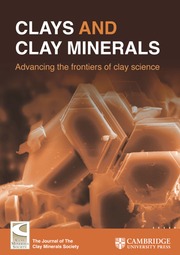Article contents
A First-Order Markov-Chain Model of Zeolite Crystallization
Published online by Cambridge University Press: 02 April 2024
Abstract
A method using a finite, first-order Markov chain is presented to estimate rate constants for zeolite formation from experimental nuclear magnetic resonance (NMR) data on the abundance of different silica oligomers. An experimental design is suggested by which this method can be implemented. The method uses weighted least squares to estimate transition probabilities from aggregate NMR data. Rate constants, equilibrium constants, and free energies of elementary zeolite-forming reactions can be estimated. Hypothetical zeolite-forming reactions can also be modeled. An example of modeling, using hypothetical data, shows how zeolite formation can result from reactions involving mainly silica cyclic tetramers.
Information
- Type
- Research Article
- Information
- Copyright
- Copyright © 1989, The Clay Minerals Society
Footnotes
Presented at Symposium on the Geology, Genesis, Synthesis, and Use of Zeolites at 38th annual meeting of The Clay Minerals Society, Jackson, Mississippi, October 1986, convened by R. J. Donahoe. Manuscript reviewing and editing coordinated by R. J. Donahoe and R. A. Sheppard.
References
- 2
- Cited by

